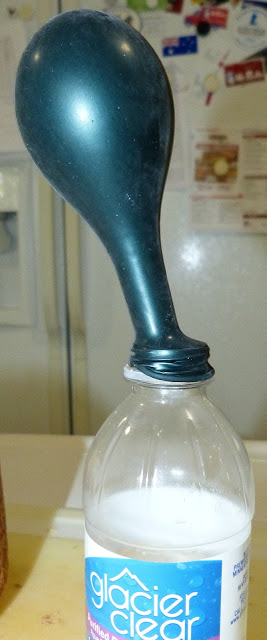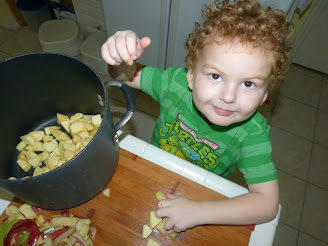I hope you enjoyed lots of letter Aa activities last week - if you missed that post, see it here. Now let's get busy with the letter Bb! There are SO MANY great things you can do to reinforce the connection between the letter B and the sound |b|: ride bikes, blow bubbles, bathe baby dolls, bake bread and more! There are so many in fact, that I'm going to break this week up into 2 blog posts - are you ready to get started?
Activity #1 Bake bread.
Yum! If you have access to a bread machine it is super easy to make bread, but even if you don't, it's worth the time! After you get online and find a recipe that appeals to you, you and your little one will do a lot of math as you prepare your dough: measuring teaspoons and tablespoons of ingredients, counting in cups of flour, and don't forget the real life skills of scooping and pouring. I've baked bread literally hundreds of times with children as young as 2.5, and the trick is to let them help however they can. You probably don't want to have them measure and pour cups of water - how much would make it into the dough, and how much would spill? Some things are too heavy for little hands, and some measurements need to be relatively precise.
What to do? Hold their hands in yours and help them scoop teaspoons of ingredients, then let them dump it in.
Have them rest a measuring tool on the edge of the mixing bowl, and you pour liquid ingredients into that, then they dump it in.
If you're using a bread machine, show them which button to push to start it, and hold the lid open and watch it go for a minute.
If you're kneading by hand, share the dough with them and let them knead for as long as they can - if you're talking about the bread, the sticky feeling of the dough, how you want to eat it when it's done, they'll hold out longer - and strengthen their hands as they do!
Once you've got the bread started, consider taking a close look at a piece of bread together. Does your child notice all the bubble holes in the bread? That's what makes it light and fluffy to eat!
Yeast is the ingredient that makes the bubbles, and it needs warm liquid to do it. If you put a little yeast in some warm water in an empty bottle, add a pinch or two of sugar, then stretch a balloon over the bottle, you'll trap any gas the yeast makes.
It will probably take about as long as baking the bread does - so it's great to do these things at the same time!
Of course the best part of baking bread is eating it (smelling it cook is a close 2nd)! Still, make sure you save a little for the next activity.
Activity #2: Teddy bears picnic
Bread isn't the only food that starts with the letter B - there's bananas, berries, bologna, broccoli... enough to make an excellent teddy bears picnic! I like to read the book, but you can also listen to the song on YouTube.com, and then pack your basket with food that starts with B, grab your favorite bear(s) and book(s) and head to the backyard to enjoy your picnic!
Activity #3: Go on a Bear Hunt
I learned this song / game first from Dr Jean's song, then later found the book and story retelling by Michael Rosen, and later still the version from The Learning Station. My favorite is the book - and seeing the author tell it is fantastic! However you learn it, going outside and pretending to go on a bear hunt is FUN!
While you're outside for your bear hunt, take a little time for:
Activities 4, 5, 6, 7 & 8: Bounce balls, bathe baby dolls, ride bikes, blow bubbles, and observe bugs!
That's more than enough for one blog post - but come back on Wednesday for a second installment of letter Bb activities!

























